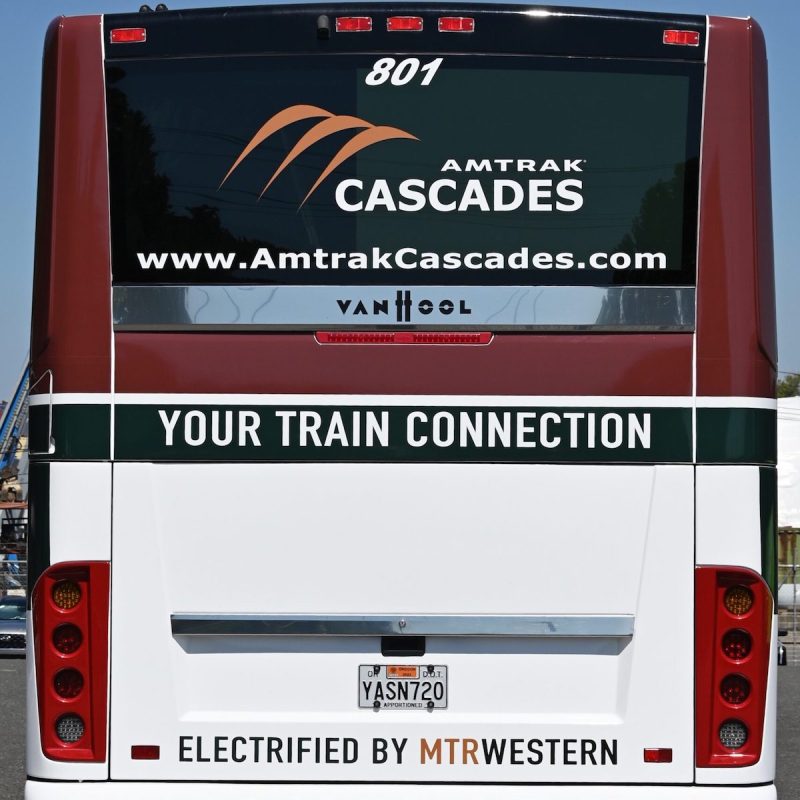
In a move that’s sure to please everyone concerned about the environment, Amtrak and the Washington Department of Transportation have announced they will replace a diesel-powered bus with an electric vehicle for part of the popular Amtrak Cascades route.
Videos by TravelAwaits
Daily midday buses play an important role in service on Amtrak’s Cascades route because they provide connectivity in addition to the morning and evening train service that makes the roughly 90-mile trip between Seattle and Bellingham, Washington. The Cascades Thruway buses also stop in Everett and Mount Vernon, Washington, and connect with trains heading to and from stations south of Seattle.
As the first electric vehicle (EV) in the Amtrak National Network, the bus — which is owned and operated by charter bus and shuttle transportation company MTRWestern — can make the nearly 200-mile round trip on one charge, Amtrak explains.
“We strive to give our passengers reliable, comfortable, and sustainable travel options,” Kara Oldhouser, Amtrak’s sustainability director, said in a statement. “By incorporating environmental considerations into our current operations and as we work with our partners to reach more of America, we continue to make Amtrak an even ‘greener’ mode of transportation.”
Roger Millar, Washington’s secretary of transportation, notes that the Washington Department of Transportation (WSDOT) is the first DOT in the country to offer electric bus service on an intercity route.
“Amtrak Cascades trains already operate with locomotives that meet the EPA’s highest standards — reducing emissions by 86 percent after replacing older locomotives in 2017,” Millar explained. “Adding a bus to our fleet that is powered by clean energy further affirms our commitment to offer environmentally friendly travel options in the Pacific Northwest.”

What The EV Bus Offers
MTRWestern’s contract with Amtrak is an important push toward providing sustainable travel because the EV bus will save approximately 10,000 gallons of diesel fuel per year, Amtrak explains. That will lead to cutting CO2 emissions by 109 tons annually.
What’s more, the bus’ charging hub, which is at MTRWestern’s Seattle facilities, sits on land that was once used to store petroleum tanks.
“The future is electric, and we are committed to delivering carbon-free intercity and group transportation throughout the Pacific Northwest,” said Jeremy Butzlaff, president of MTRWestern. “We consider the collaboration on this route a transformational step towards even greater EV regional transit.”
More Green Changes On The Horizon
It should also be noted that adding the EV bus to the daily Thruway schedule helps Amtrak work on its pledge to achieve net-zero greenhouse gas emissions across the Amtrak Network by 2045. That target focuses on efforts across Amtrak’s entire carbon footprint to reduce the environmental impact from operations while safely moving people.
To achieve that pledge, Amtrak has announced it will:
- Take steps to achieve net-zero greenhouse gas emissions by increasing energy efficiency and then implement renewable fuels and energy.
- Reduce diesel fuel consumption by using advanced technologies including fuel-cells, hydrogen, batteries, and other zero-emission technologies.
- Achieve 100-percent carbon-free electricity by 2030 by ultimately using carbon-free electricity through renewable energy generation and power purchase agreements.
For more about trains, be sure to read our Rail content, including:
